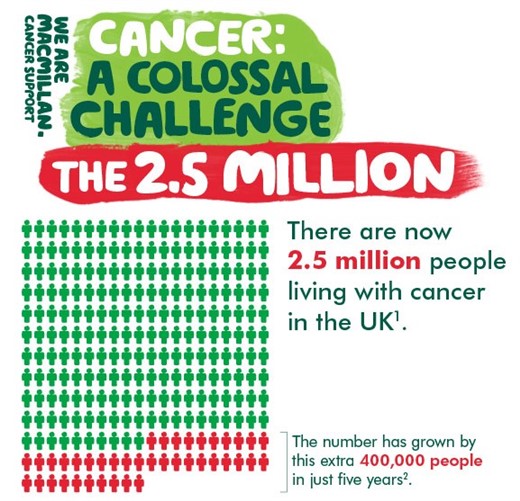Have you heard of the cancer registry? It’s the automatic collection of data about people and cancer to help with research and cancer care. In today’s blog, Library and Information Specialist Ed demystifies the cancer registry.
Every day around 1,000 people across the UK will find out that they have cancer. It’s estimated that half of all people will receive a cancer diagnosis at some point in their lives. However, great steps have been made in understanding what causes cancer and how best to diagnose and treat it.
Today, people are twice as likely to survive at least 10 years after being diagnosed with cancer then they were at the start of the 1970s. This progress is greatly helped by the collection of accurate and complete information about the people who get cancer. This information is collected through something called the cancer registry.

Why is it important that detailed data on everyone with cancer is collected?
This information helps:
The data that is collected provides information on how many people are diagnosed with cancer, what treatments they have, and how long they live.
This information can then be used to:
How is the data collected?
When a person is diagnosed with cancer, information about them is automatically sent by hospitals and healthcare professionals to the cancer registry in the relevant country. The registries contain information about each person who has been diagnosed with cancer.
This includes:
Information about outcomes, such as the date that treatment ended, may also be included if relevant.
Because it is so helpful to know about every case of cancer in the population, cancer registries have been given legal permission to collect patient information without needing to ask the individual. However, you have a right to choose not to have information about you or your child stored in the registry. Contact the cancer registry in your country to do this - see below for details. This will not affect the care that you or your child is given.
There are strict rules to make the sure that the information in the registries is kept safely and securely. Cancer registries take great care to keep the information they hold about patients confidential. As with other medical records, ethical and security safeguards are in place and access is controlled.
Who collects the data?
The collection of data on cancer is managed by specific agencies in each of the four UK nations:
The United Kingdom and Ireland Association of Cancer Registries (UKIACR) is an umbrella organisation for all the above cancer registration services. It aims to promote and develop cancer registration in England, Wales, Scotland, Northern Ireland, as well as the Republic of Ireland (National Cancer Registry Ireland).
Where can I find out more?
To find out more about the collection of cancer data, as well as how Macmillan works with the UK cancer registries, visit this page on the Macmillan website.
Every cancer department in the NHS should have leaflets about the cancer registry available.
To see what else Macmillan's cancer information team has been blogging about, please visit our blog home page! You can subscribe to receive our blogs by email or RSS too.
We're with you every step of the way
The Macmillan team is here to help. Our cancer support specialists can answer your questions, offer support, or simply listen if you need a chat. Call us free on 0808 808 00 00.
Comments? Feel free to add them below (you need to be logged in).
Keep in touch Follow Macmillan’s cancer information team on Twitter @mac_cancerinfo
Whatever cancer throws your way, we’re right there with you.
We’re here to provide physical, financial and emotional support.
© Macmillan Cancer Support 2026 © Macmillan Cancer Support, registered charity in England and Wales (261017), Scotland (SC039907) and the Isle of Man (604). Also operating in Northern Ireland. A company limited by guarantee, registered in England and Wales company number 2400969. Isle of Man company number 4694F. Registered office: 3rd Floor, Bronze Building, The Forge, 105 Sumner Street, London, SE1 9HZ. VAT no: 668265007